NHRC holds a meeting of the Core Group on Health and Mental Health
Press release
National Human Rights Commission
New Delhi, 25th April, 2024
NHRC holds a meeting of the Core Group on Health and Mental Health
NHRC Chairperson, Justice Arun Mishra says welfare schemes must be implemented in the right spirit and benefits must reach the needy
Discussions included finding ways to address the issue of bonds in medical colleges, rights of patients, rights of doctors, and problems in the disbursal of stipends to doctors
The National Human Rights Commission (NHRC), India organized a meeting of the Core Group on Health and Mental Health issues. The aim of the meeting was to deliberate upon the rights of patients and doctors. The meeting was held in hybrid mode, chaired by Justice Shri Arun Mishra, Hon’ble Chairperson, NHRC, in the presence of Shri Rajiv Jain, Member, NHRC, Shri Bharat Lal, Secretary General, Shri Ajay Bhatnagar, Director General (Investigation), Shri Devendra Kumar Nim, Joint Secretary and other officers of the NHRC. The meeting was attended by the members of the Core Group, representatives from the Government, including the Ministry of Health and Family Welfare, and DGHS; National Medical Commission; Indian Medical Association; eminent doctors and domain experts from the field; academicians; and Resident Doctors’ Associations.
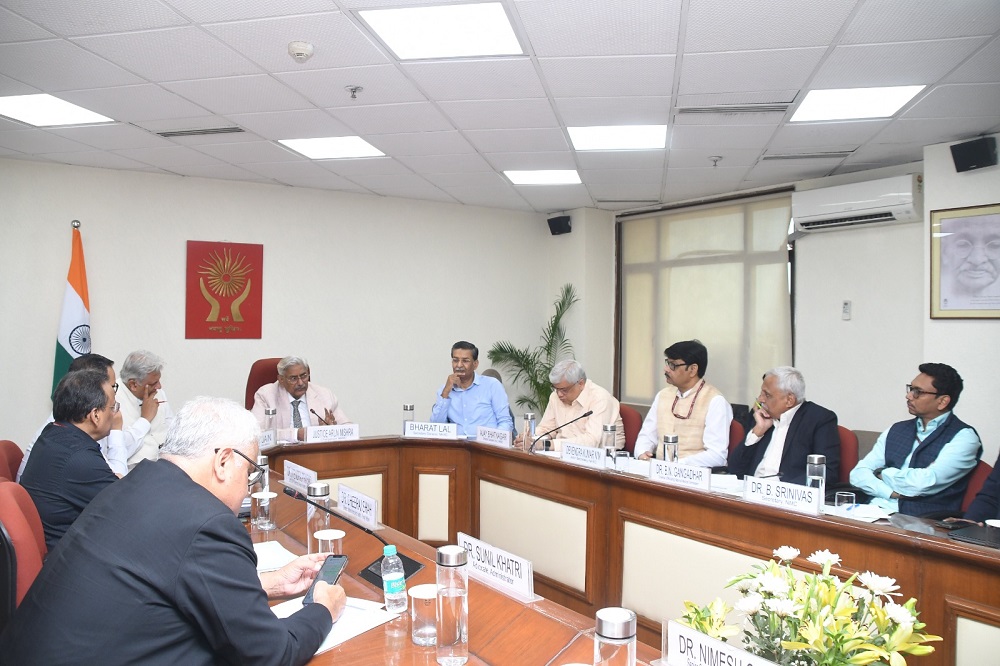
The meeting was held in four technical sessions, including the issuance of bonds in medical colleges, the issues related to disbursal of stipend to doctors, the rights of the patients and the rights of the doctors.
In his inaugural address, NHRC Chairperson, Justice Arun Mishra highlighted that the rights of doctors and the rights of patients are like the two pillars that hold our healthcare system. He emphasised on various challenges faced by both patients and the doctors in our country, focusing on the enormous work pressure on the doctors, lack of basic facilities for the doctors in hospitals, and issues related to cases of alleged medical negligence against doctors. While talking about the rights of the patients, Justice Mishra shared from his visits to mental health institutes last year, the undignified conditions in which the patients were living, lack of sanitation and hygiene, and practice of keeping the patients in hospitals even after their recovery. With regard to the cases of medical negligence, Justice Mishra stated that while we want to make the doctors feel guilty for any negligence, we fail to understand the pressure and burden placed upon them.
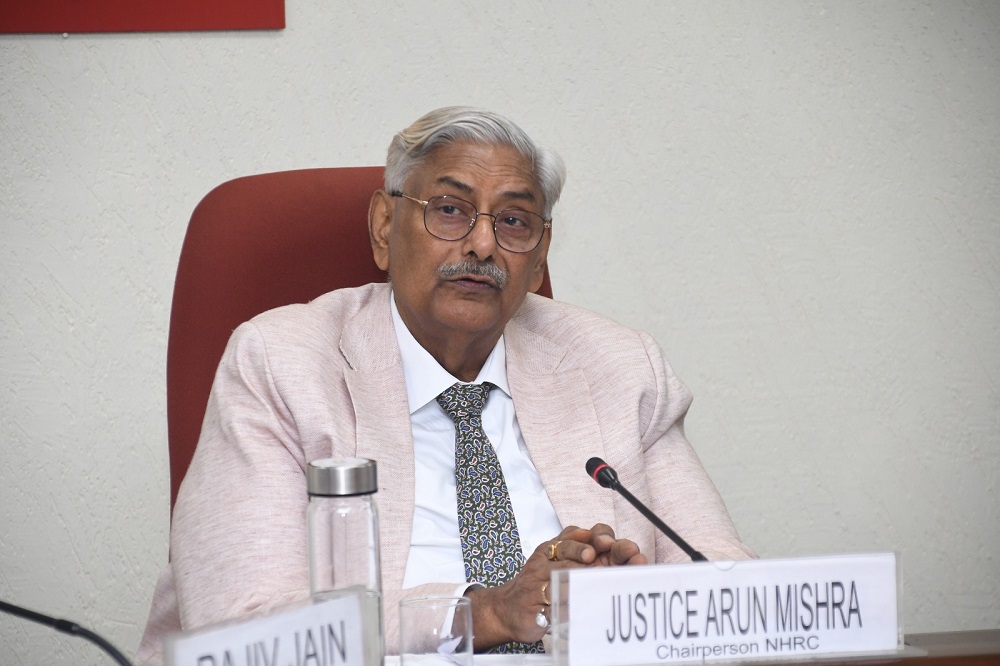
Justice Mishra underscored that all of these issues are not issues of individuals, but signifies a systemic issue. He acknowledged that the healthcare system is overburdened, but also said that there is a strong need to implement the existing laws and schemes for the welfare of all, especially the Ayushman Bharat scheme, which has the potential to be a great success if implemented properly and fully. He mentioned about the unfortunate phenomenon, where top Indian doctors were willing to practice in foreign countries, serving at the rural level, but in India they don’t want to serve in remote areas for even 2-3 years. Therefore, there was a necessity of bonds, upheld by the Hon’ble SC; however, according to Justice Mishra, the bond system shouldn’t be exploitative and should be reformed reasonably to enforce the purpose behind it. He did acknowledge that while health is a state subject, there could be some standard guidelines that may be prescribed for the bond system with the help of all stakeholders. There are multiple social welfare schemes and provisions facilitated by the government, but are we able to transfer the benefits of these schemes directly to the needy, questioned Justice Mishra. He concluded his address reflecting hope that all the stakeholders must work untiringly and must implement all the schemes in the right direction for the welfare for people, especially, the marginalised.
Shri Rajiv Jain, Member, NHRC in his address briefed about the rights of patients and the doctors. He emphasised on the issue of bonds in medical colleges and disbursal of stipend to doctors. While quoting the landmark judgment of Jacob Mathew v. State of Punjab, he emphasised that there is a need for the NMC and the government to form guidelines with regard to cases of medical negligence. Furthermore, a large number of states still lack Medical Boards that are tasked with reviewing complaints of alleged medical negligence, which must be addressed on priority.
Highlighting a few challenges, Shri Jain gave the example of categorisation of medical establishments to highlight that most of the provisions of the CEA have not been legally implemented. Similarly there are other significant provisions that impact the rights of health of patients in the CEA, which need to be formally notified by the Ministry of Health & Family Welfare to enable its implementation. In cases of non payment of stipend, there are hundreds of cases received by the Commission. Shri Jain pointed out that the NMC in this issue says that the implementation of its regulations is for the “appropriate authority” in the state, while not defining who the appropriate authority is.
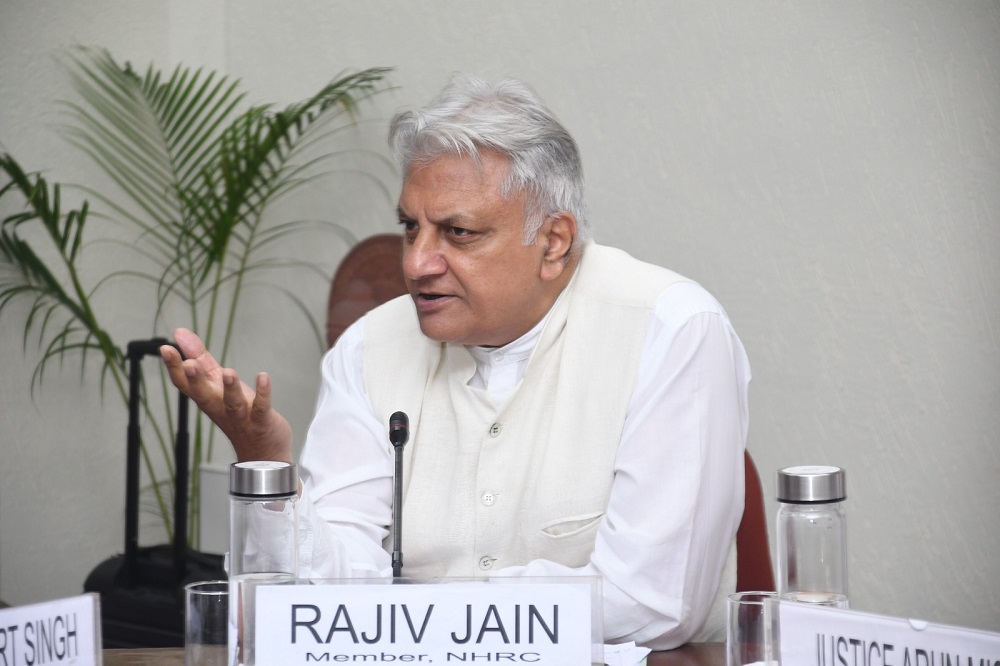
The Member also stressed on the working conditions of the doctors, calling attention to their long working hours and continuous shifts, lack of proper restrooms, hygiene, lack of rest etc. He reiterated that doctors have fundamental rights that are necessary for them to carry out their tasks in an efficient manner, just as patients have rights within the healthcare system.
He underlined that violence against doctors has an adverse impact on medical professionals. It can result in poor patient care in addition to stress, worry, or psychological damage. It is, therefore, crucial to address this issue by strengthening the legal framework, enhancing security measures, promoting communication and proper support system for doctors and all medical health professionals.
Shri Bharat Lal, Secretary General focused on the virtues of compassion and empathy towards all human beings, especially to the most vulnerable sections of the society. He mentioned that the cases of deaths by suicide amongst medical students is quite disturbing and require immediate attention. He said that we can’t afford half-measures and dithering as all inaction has consequences and end of the day someone is paying the price. Similarly, suffering of patients due to negligence is unacceptable.
Appreciating the government for having various schemes and making provisions for the welfare of the people, he highlighted that it is the duty of officers to implement them in full spirit. If not implemented fully, it contributes to many challenges that we are discussing today.
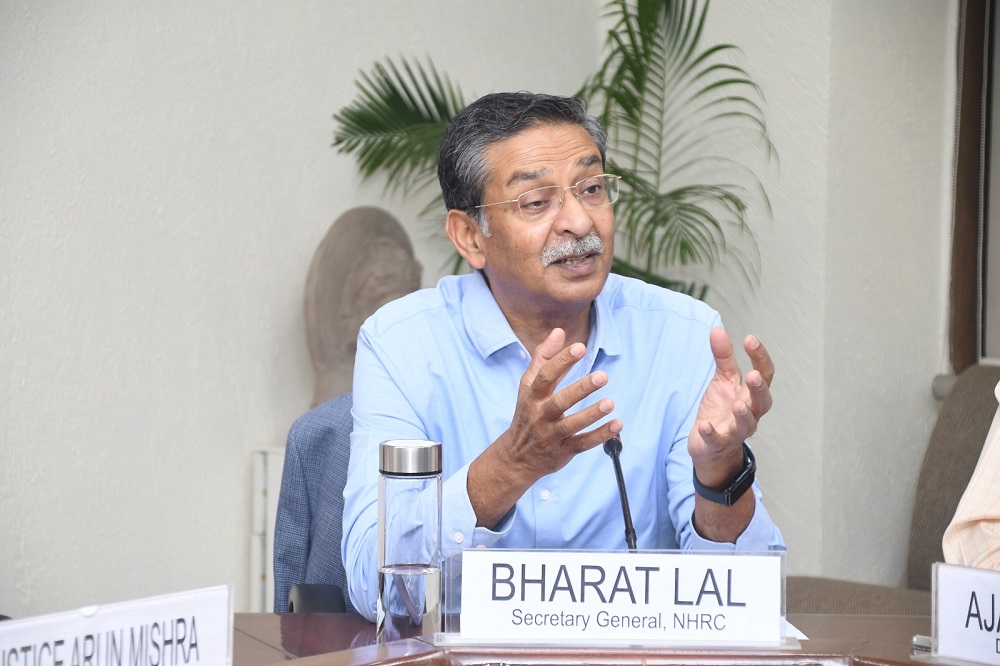
Talking about the Mental Healthcare Act, 2017, the Secretary General said that despite the best intentions of the government and the Parliament, the Act has not been fully implemented throughout the country which accentuates the existing challenges. He expressed his expectations from the meeting that the deliberations would result in specific and actionable recommendations, and also pave the way towards implementation in letter and true spirit, leading to the real change on ground.
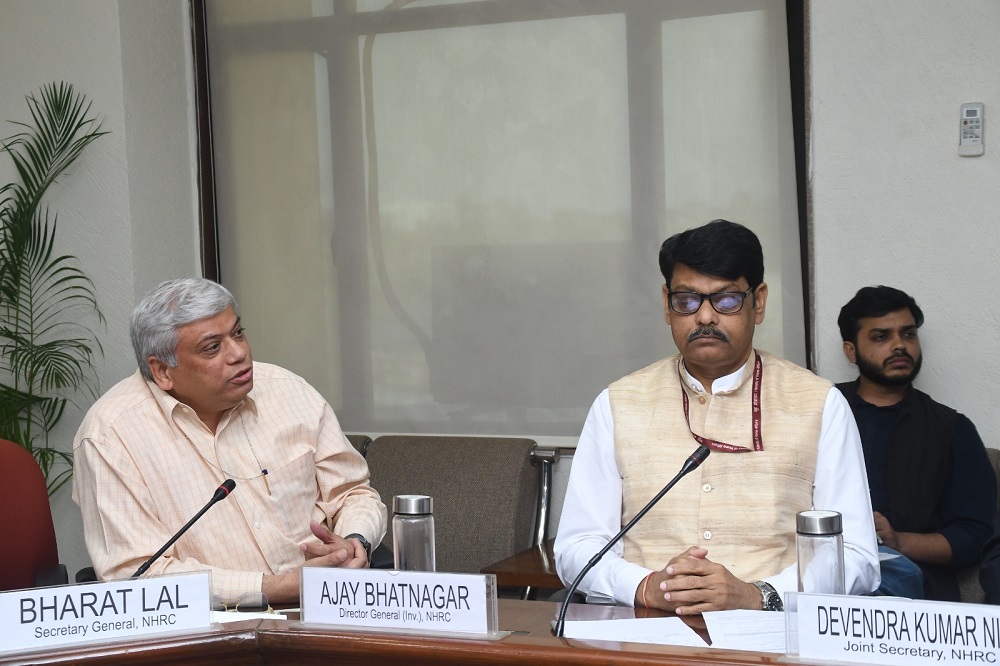
Shri Ajay Bhatnagar mentioned that as a laudable practice, senior doctors are looking after their juniors, being their mentors and guiding their work, so that the young doctors have a sense of confidence, and have someone to approach. “A happy doctor is a good and efficient doctor”, Shri Bhatnagar said. If a doctor gets adequate rest, facilities and time to look after himself, his performance will definitely improve. He emphasized that the strength of any organisation comes from the organisational culture.
Shri Devendra Kumar Nim, Joint Secretary, gave an overview of the four sessions of the meeting, highlighting the significance of each topic and requested all the participants to share concrete and actionable recommendations that can be taken up by the Commission for further appropriate action.
Dr. B. N. Gangadhar, Chairman (Officiating), National Medical Commission provided his inputs throughout the technical sessions, on behalf of the NMC. One of the crucial points shared by him was that the NMC has constituted a committee under the chairmanship of Director, NIMHANS, Bangalore, to look into the matter of deaths by suicide and drop-outs of medical students. He also shared that they are now promoting yoga to deal with stress in doctors and medical students. He also focused on the issue of bond system, mental health of medical students, and mental health human resource in the country.
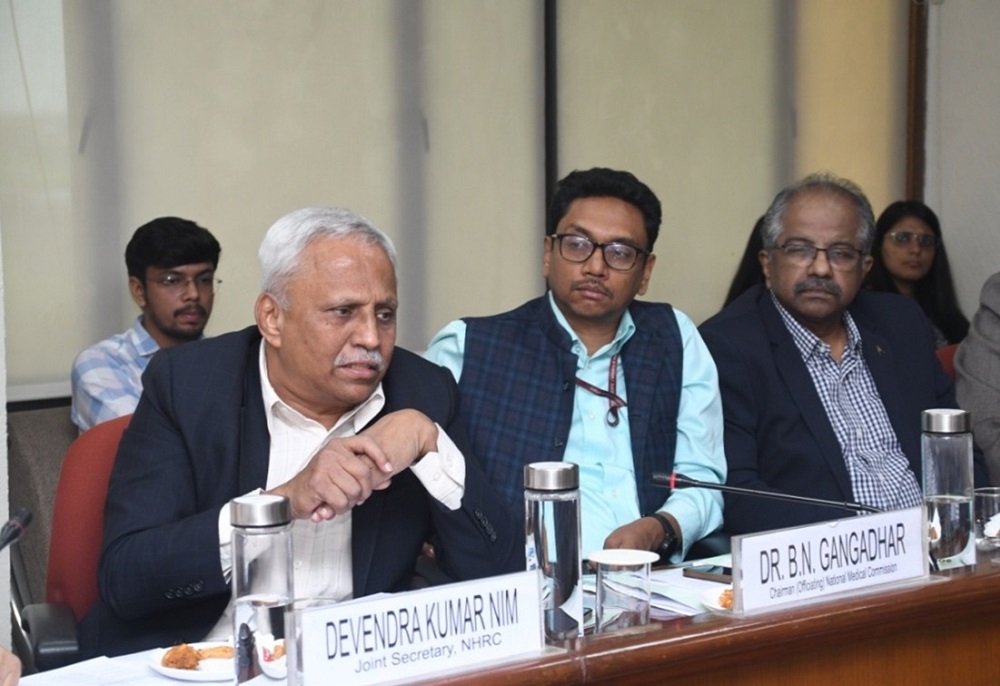
Other issues, such as female PG students not receiving benefits during their maternity leave; poor living and working circumstances; physical and biological risks in the workplace; psycho-social pressures; heavy workload; erratic work schedules, lone women doctor postings in distant buildings/ departments; unreliable pay schedules; lack of necessary facilities like proper washrooms, especially for women; and other professional stressors were also discussed during the meeting.
Other prominent speakers in the meeting included Shri Elangbam Robert Singh, Joint Secretary, Dept. of Health & Family Welfare, M/o HFW, GoI; Dr. Jitendra Prasad, Addl. DGHS, Directorate General of Health Services; Dr. M C Misra, former Director, AIIMS; Prof. R K Dhamija, Director, IHBAS, Delhi; Dr. Nimesh Desai, Senior Consultant Psychiatrist, Core Group Member; Dr. Abhay Shukla, Public Health Specialist, Core Group Member; Dr. Sunil Khatri, Advocate; Dr. Shivkumar Utture, National Vice President, IMA; Dr. Rajesh Sagar, Prof. of Psychiatry, AIIMS; Dr. Aviral Mathur, President, Federation of Resident Doctors Association (FORDA); Dr. Rohan Krishnan, National President, Federation of All India Medical Association (FAIMA); Dr Shankul Dwivedi, IMA Junior Doctors Network; Dr. Rajeev Ranjan, co-founder, Aid for Mankind; and Dr. Vivek Pandey, RTI activist.
***







 राष्ट्रीय मानव अधिकार आयोग, भारत
राष्ट्रीय मानव अधिकार आयोग, भारत

